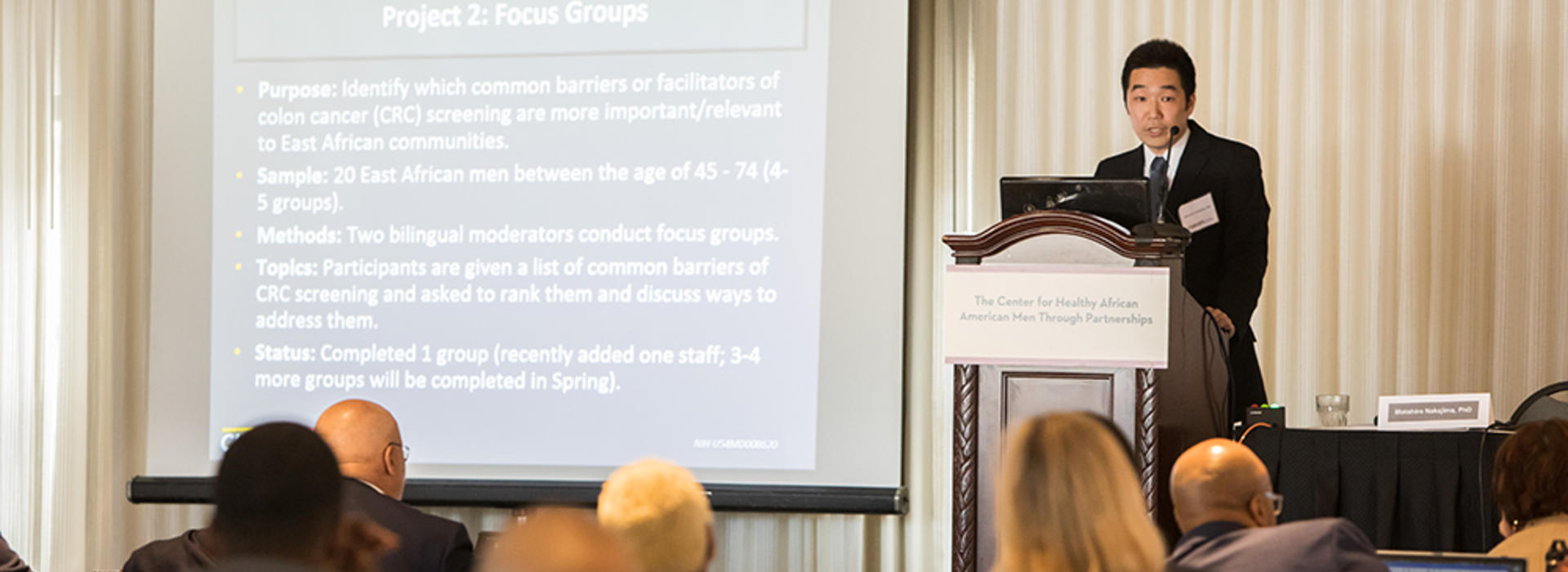
U Medical School Studying Colorectal Cancer Disparities in East African Men
Minnesota is home to many different people, including one of the largest East African populations in the country. Two communities—Somalis and Ethiopians in Minneapolis and St. Paul—face many challenges as immigrants living in the United States, particularly in healthcare. Motohiro Nakajima, PhD, an assistant professor, and Mustafa al’Absi, PhD, a professor, both in the University of Minnesota Medical School’s Department of Family Medicine and Biobehavioral Health on the Duluth campus, recognized how these cultural challenges create health disparities.
“We started talking to our students, and students connected us to seniors in the community, and those seniors connected us to leaders in various areas in their community, and from there, we started discussions,” Dr. Nakajima said. “As we built our relationships, we discussed what health issues that they are concerned about that we could work on with their community. One topic was colorectal cancer.”
Dr. Nakajima said data from a statewide survey by the MN Community Measurement showed a lower rate of colorectal cancer screenings among East African men relative to other groups in Minnesota.
“I really started to think about what I could do to work on this issue and reduce this disparity, but how to do it was something that I didn’t know at that time,” Dr. Nakajima said.
As he began to wonder how, he partnered with Dr. al’Absi and applied for a grant from the Center for Healthy African American Men through Partnerships. The funding, which they received in 2017, helped them take a deeper look at the psychosocial and cultural factors for East African men that enhance or reduce the likelihood of receiving life-saving cancer screenings.
In a three-part study, Dr. Nakajima and team conducted a survey, hosted focus groups and held community educational workshops targeted toward East African men over the age of 45—an age when the risk for colon cancer starts to increase. The entire study, including the hosts and written materials, was designed in partnership with senior leaders and expert translators from their communities.
In the survey, Dr. Nakajima said, “We asked, in a self-report manner, whether or not they had done certain cancer screenings and their attitudes toward cancer screenings. We did some preliminary analysis and found that, in men who are not up-to-date in colon cancer screening, low susceptibility to cancer and distrust in the healthcare system were related to no intention to receive colon cancer screening in the next 12 months.”
The focus groups elaborated on these attitudes. With a total of 23 men, bilingual research staff members moderated the groups who were asked to share common barriers of colorectal cancer screenings and discuss ways to address them.
“What I can share is that people reported personal barriers and cultural beliefs that may impact willingness to undertake cancer screenings; there are also systemic barriers,” Dr. Nakajima said. “Personal barriers are things like lack of knowledge—disease prevention is a new concept for many people in these communities. So, visiting clinics for health screenings on a regular basis is not something that they are used to doing when they are in their home country. Logistical issues, such as lack of transportation and access to clinics, are another factor. Then, there are cultural beliefs—for example, men in our group, preferred to be seen by a male provider. These barriers are interrelated.”
The final project—a community educational workshop—enlisted the support of a Somali doctor, who is well-recognized in the community, and an Islamic faith leader to serve as the faces and voices of a pre-recorded educational video about colorectal cancer screenings.
“We wanted to have these two figures discuss the importance of preventive health from religious and medical perspectives to resolve some of the misconceptions toward cancer and cancer screening that are common in the community,” Dr. Nakajima said. “There is a need to develop culturally appropriate intervention programs that are aimed at increasing cancer screening.”
Now, after gathering valuable data, Dr. Nakajima and his team plan to publish what they’ve learned and use it to develop a tailored colorectal cancer screening intervention for East African individuals using the patient navigator model.
“These people face lots of barriers from personal to system-based,” Dr. Nakajima said. “Patient navigators could help identify and reduce individual and logistical barriers so that patients can gain timely access to needed health care.”